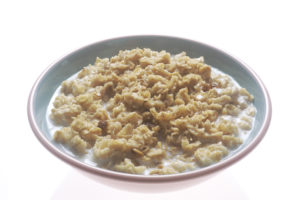 The controversy over the pesticide Roundup and glyphosate (which is the active ingredient in Roundup) rages on. This week the Environmental Working Group (EWG) published results of independent laboratory tests (commissioned by them) that looked at glyphosate levels in common oat based foods (cereals, oatmeal, granola, and snack bars). Not surprisingly, they found glyphosate in almost all conventional cereals and at much higher levels than the little they found in some organic cereals (it was felt this was from cross-contamination or "pesticide drift" from conventional farms onto organic farms).
The controversy over the pesticide Roundup and glyphosate (which is the active ingredient in Roundup) rages on. This week the Environmental Working Group (EWG) published results of independent laboratory tests (commissioned by them) that looked at glyphosate levels in common oat based foods (cereals, oatmeal, granola, and snack bars). Not surprisingly, they found glyphosate in almost all conventional cereals and at much higher levels than the little they found in some organic cereals (it was felt this was from cross-contamination or "pesticide drift" from conventional farms onto organic farms).
The main questions are: Why is this pesticide found in foods? What, if anything, does this mean for our health? Are these levels safe?
The main thing to know: Glyphosate is the most heavily used herbicide (a type of pesticide) in the world. Over 250 million pounds were applied in the U.S. in 2015, with much of the application in the Midwest. Incredibly huge amounts of glyphosate are used in the midwest on farmland - greater than 88.6 pounds per square mile! Top crops it's used on are corn, soybeans, canola - especially genetically modified Roundup Ready crops.
It is also used as a dessicant right before harvest ("preharvest") on many crops, such as wheat and oats (see Monsanto's guide for preharvest use). This is why harvested crops have glyphosate residues on them, and the foods we eat. Note that glyphosate (Roundup) can not be used on organic crops.
The herbicide has been linked to a number of health problems, including cancer, birth defects, endocrine disruption, and reproductive problems. (Posts on glyphosate.) There are currently hundreds of lawsuits from farmers and others claiming that Roundup gave them cancer. This past week a California jury awarded $289. millions dollars to a man who said his cancer was due to repeated glyphosate weed killer (including Roundup) exposure as part of his job.
A new concern is that glyphosate has an effect on our gut bacteria - that it messes with the human gut microbiome. Also, that Roundup has more of an effect than glyphosate alone (what's in all those hiddden inert ingredients?) At this point we just don't have all the answers, but there is cause for concern.
Whether these government allowed levels of pesticide residue in our foods are "safe" is also being hotly debated. The chemical industry and EPA say it's safe, while a number of researchers are saying no. It has been pointed out by many that the chemical industry (Monsanto - the makers of Roundup) and the EPA have worked hand in hand to make sure that Roundup is considered "safe".
Also, government allowable levels of glyphosate in foods (called tolerance for pesticide residue) were raised when the pesticide industry lobbied for that (which happened when Roundup Ready crops were introduced and as preharvest use increased). The EPA for years deliberately did not look at how much glyphosate residue is in our foods - if you don't know, how can you be concerned?
Research now shows that MOST people have detectable glyphosate residues in them, including most pregnant women. [See all glyphosate posts.]
Both Quaker Foods and General Mills (their product Cheerios was among those with higher levels of glyphosate residues) responded to the EWG report by saying that their products are safe because the glyphosate residue levels in their products are within the EPA’s acceptable levels. Yes, but are these levels really safe? Especially if a person eats many foods with multiple pesticide residues daily.
Bottom line: We just don't know what these small, but increasing levels of glyphosate residues in our food and our bodies means for our health. If you are concerned, and I am, then try to eat organic foods when possible, especially organic corn, soybean, canola, wheat, and oats in order to try to minimize glyphosate levels in your body. Glyphosate and Roundup is not allowed to be used on organic crops.
